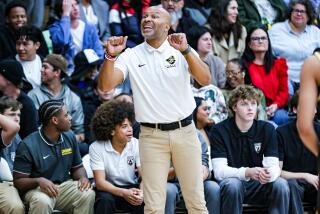TV review: ‘4th and Forever’
- Share via
The reputation of the Long Beach Polytechnic High School football team is such that when I casually mentioned the new reality show “4th and Forever,” my husband, who played for Poly rival Lakewood High School, instantly (and rather alarmingly) rattled off five or six plays that contributed to Lakewood’s defeat one year as well as the names of Poly’s then-backfield, which included future NFL Hall of Famers Earl McCullouch and Gene Washington.
Named the sports school of the century by Sports Illustrated, Long Beach Poly has sent more players to the NFL than any other high school, so it’s a bit surprising that no one has done a documentary on its football program before. Also unfortunate. As gratifying as it is to see some of the inner workings of a local phenom, “4th and Forever” falls far short of its subject matter, proving once again the limits of reality television.
The first flaw is the premise — in 2009, Long Beach Poly had its first bad season in years, going 6-6 and losing to Lakewood for the first time in 25 years. This Must Never Happen Again is the drumbeat of “4th and Forever,” with head coach Raul Lara vowing they will once again become champions or he will be outta there. So, right away, we have an overly hyped tension shoved down our throats, which is totally unnecessary — unlike the living rooms and nail salons of “The Real Housewives,” football comes with built-in actual drama.
The very real obstacles many of these young men face in their lives are also oversold. When they say they want out of Long Beach, they aren’t talking about the harbor with the fabulous aquarium or Belmont Shore, they’re talking about the pockets where gangs, drug dealers and drive-bys are common.
But while senior running back Jeremiah Hollowell was living the gang life before his son was born, the other few players featured appear to come from homes where the pressures are more academic and family related — defensive back Dabness Atkins, for instance, has his eyes on the Ivy League.
Which is drama enough. As are the rigors of a football program that must live up to its legend whether it had a bad season the year before or not. But for reasons known only to the producers, “4th and Forever” spends far too much time talking about the difficulties and significance of this year and hardly any time actually showing them.
The best moments in the first two episodes are those depicting the players interacting with their families, but even those often seem manipulated. For instance, when quarterback Chaiyse Hales learns that Coach Lara has chosen him (over Lara’s own son) to start in the first game, Hales tells his mother that he wishes his father, whom he hasn’t seen in five years, could see him play.
One amazingly friendly phone call later, and here’s Dad surprising his son before the game. Hales plays brilliantly, but the audience is left hanging — um, “Why haven’t you seen your son in five years?” and “Will you be staying in better touch now?” are just a couple of reasonable questions the producers could have asked, but did not.
Never mind the inconsistent lighting, the deplorable fake announcer describing the plays, the mindless motivational speeches Lara gives. It’s the lack of respect that “4th and Forever” shows toward the real and extraordinarily hard work it takes to become an excellent athlete that rankles.
These young men obviously train hard, and it would be nice to see that rather than one more person say a variation of “this is my last chance.” From the LeBron James film “More Than a Game” to HBO’s “Magic & Bird: A Courtship of Rivals” to last year’s excellent “30 for 30” series on ESPN, this is the age of the great sports documentary, and Long Beach Poly — the team, the school and the story — deserves better.
More to Read
The biggest entertainment stories
Get our big stories about Hollywood, film, television, music, arts, culture and more right in your inbox as soon as they publish.
You may occasionally receive promotional content from the Los Angeles Times.











